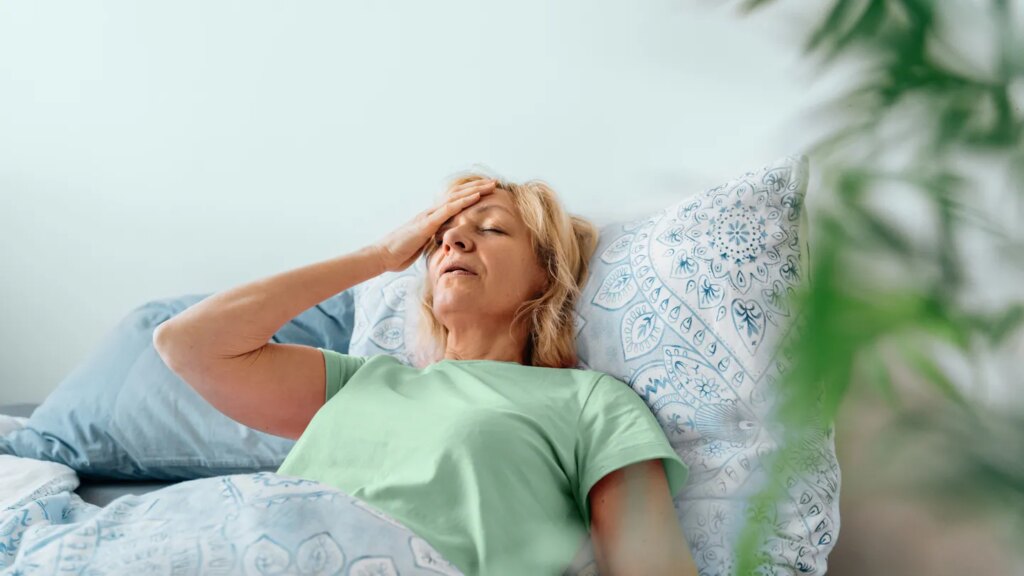Myth: Menopausal Hormone Therapy Is Dangerous
“Science isn’t black and white; it’s full of gray areas where more study is needed,” Bazella says. “That’s why something seen as a myth today might have been considered new knowledge in the past — it’s all part of the process of learning and discovery.”
“In reevaluating this study, looking at patient ages when MHT was initiated and the hormone formulation used, we now understand that MHT’s risks and benefits depend heavily on timing of initiation, individual health profile, and the therapy formulation,” Bazella says.
“I routinely recommend MHT — but not universally,” Bazella says. “It isn’t a one-size-fits-all solution … but with thoughtful evaluation, realistic expectations, and ongoing monitoring, it can be a powerful tool.”
If you have questions about MHT, Bazella recommends talking to your doctor, so that you can make a shared, informed decision based on your specific situation.
Myth: Hormone Therapy Is the Only Way to Manage Symptoms
If you’re not a candidate for MHT or feel that it isn’t right for you, there are plenty of other ways to find relief. “We can tailor the approach to the person’s symptoms, medical issues, goals, preferences, and philosophy,” Dr. Noble says.
Examples of other treatments include the following:
- Nonhormonal medications, such as neurokinin antagonists (like fezolinetant), antidepressants, gabapentin, and oxybutynin.
- Cognitive behavioral therapy, which may help with symptoms such as mood changes, sleep disturbances, and the impact of hot flashes and night sweats on quality of life.
- Vaginal treatments, including nonhormonal lubricants and moisturizers to relieve dryness and discomfort.
- Acupuncture and integrative therapies, which may offer symptom relief for some women, especially when combined with other approaches.
Additionally, Bazella says that a healthy lifestyle — including regular exercise, a balanced diet, stress reduction, not smoking, and good sleep hygiene — is crucial, even if these habits may not directly reduce symptoms. “All menopausal therapies should be in addition to these basics of health promotion,” she says.
Myth: There’s No (Good) Sex After Menopause
Hormonal changes can make intimacy feel different, but you can still have a vibrant sex life during and after menopause, Kothary says.
“As estrogen levels drop, some women experience vaginal dryness or discomfort that can make sex less enjoyable,” Kothary says. “The good news is that these symptoms are highly treatable with moisturizers, lubricants, and low-dose vaginal estrogen that restore comfort and elasticity.”
Rahman also suggests looking at additional factors — including medications, underlying health conditions, and stress — that may be affecting your sex life and relationships. “For example, treating depression and anxiety can help your sexual function, but some treatments, like selective serotonin reuptake inhibitors, can make it worse [by lowering libido], so it is important to understand all of this and get help from a sexual medicine expert.”
Open communication with your partner is also essential, Rahman says, noting that sex therapy can be a helpful tool. “Menopause can definitely [affect intimacy], but it is also a time for redefining your life and asking for what you want,” she says.
The Takeaway
- Menopause is a natural transition that usually begins in midlife as the ovaries stop producing reproductive hormones, such as estrogen and progesterone.
- Everyone’s experience is different, but many women experience an array of symptoms, such as hot flashes, night sweats, vaginal dryness, and sleep difficulties.
- If symptoms are bothering you, talk to your healthcare provider about your options, which may include a combination of lifestyle changes, medical treatments, and complementary interventions such as therapy or acupuncture.

